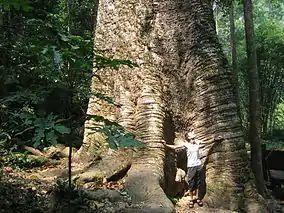Taksin Maharat National Park
Taksin Maharat National Park (Thai: อุทยานแห่งชาติตากสินมหาราช) is a national park in Tak Province, Thailand. Home to Thailand's largest tree, the park also features waterfalls, caves, and rock formations.[1]
| Taksin Maharat National Park | |
|---|---|
| อุทยานแห่งชาติตากสินมหาราช | |
 Ton Krabak Yai | |
 Park location in Thailand | |
| Location | Tak Province, Thailand |
| Nearest city | Tak |
| Coordinates | 16°50′21.541″N 98°52′4.296″E |
| Area | 149 km2 (58 sq mi) |
| Established | December 1981 |
| Visitors | 30,194 (in 2019) |
| Governing body | Department of National Parks, Wildlife and Plant Conservation |
Geography
Taksin Maharat National Park is 26 kilometres (16 mi) west of Tak town in Mae Sot District. The park's area is 93,126 rai ~ 149 square kilometres (58 sq mi).[2] The mountains of the Thanon Thongchai Range run through the park's centre.[3]
History
It is believed that the Burmese King Alaungpaya used to march his army through this area. The park's original name was Ton Krabak Yai National Park, named for the park's enormous krabak tree. On 23 December 1981, the park was designated Thailand's 38th national park. It was later renamed Taksin Maharat National Park ("King Taksin the Great") in honour of King Taksin of the Thonburi Kingdom.[3]
Sights

- Ton Krabak Yai (ต้นกระบากใหญ่) The park's main attraction is Ton Krabak Yai, a 700-year-old krabak tree measuring 50 metres (160 ft) in height and 16 metres (52 ft) in circumference. The tree is believed to be the largest in Thailand.[1]
- Saphan Hin (Stone Bridge) (สะพานหินธรรมชาติ) Saphan Hin is a natural stone bridge spanning two cliffs with a stream flowing beneath. The formation is 25 metres (82 ft) high and 30 metres (98 ft) long. Nearby is the Tran Loard Krow Cave featuring stalactites and stalagmites.[3][4]
- Namtok Pang A Noi (น้ำตกปางอ้าน้อย) This middle-sized waterfall flows all year round. It is around 20 m high, and around 2 km away from Ton Krabak Yai to the east.
- Namtok Mae Ya Pa (น้ำตกแม่ย่าป้า) This mid–sized waterfall originates from Lam Huai Mae Ya Pa in a dense forest. It flows in layers along the creek into Lam Huai Mae Tho.
- Namtok Sam Muen Thung (น้ำตกสามหมื่นทุ่ง) This giant waterfall of 30 m high originates from Lam Huai Sam Muen Luang and flows year round.
Flora and fauna
Ton Krabak Yai (Anisoptera costata) is part of the park's lower-elevation dipterocarp forest. Evergreen and pine forests inhabit the park's higher elevations.[3] Other tree species include Baccaurea ramiflora and Toona ciliata.[5]
Animal species include sambar, northern red muntjac, common palm civet, mongoose, treeshrew and wild boar.[5] The park is a noted bird watching area, with species including ashy drongo, barn swallow, black-naped oriole, collared scops owl, great barbet, greater coucal, green pigeon, olive-backed sunbird, Oriental white-eye, plaintive cuckoo, scarlet minivet, sooty-headed bulbul, spotted dove,[5] tiger shrike, forest wagtail, and Chinese pond heron.[1][3]
References
- Williams, China (2010). Lonely Planet Thailand (13th ed.). Lonely Planet Publications. p. 417. ISBN 978-1-74220-385-0.
-
"ข้อมูลพื้นที่อุทยานแห่งชาติ ที่ประกาศในราชกิจจานุบกษา 133 แห่ง" [National Park Area Information published in the 133 Government Gazettes]. Department of National Parks, Wildlife and Plant Conservation (in Thai). December 2020. Retrieved 1 November 2022, no 38
{{cite web}}: CS1 maint: postscript (link) - "Taksin Maharat National Park". Department of National Parks (Thailand). Archived from the original on 23 May 2013. Retrieved 2 July 2013.
- "Taksin Maharat National Park". Tourism Authority of Thailand. Retrieved 23 June 2017.
- "Taksin Maharat National Park". National Parks in Thailand (PDF). Department of National Parks (Thailand). 2015. pp. 100–101. ISBN 978-6-1631-6240-3. Archived from the original (PDF) on 15 February 2017.